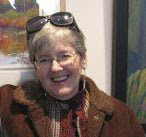Early one winter's evening I sat on a weathered rocking chair,
on the back porch of an old wooden church,
a busy Metro station nearby.
I was slowly sipping a cup of coffee looking up at the cloudy sky.
It was quite cold, but lovely in its' unanticipated silence.
My gaze moved downward and settled on what appeared to be
an old brown barn just over the fence.
In the darkening night, a frisson of recognition jolted me.
My first childhood home had a dark brown barn.
I only lived there my first seven years, but
recurring memories are as vivid as an iMax movie,
quittance for an unreliable memory of the here and now.
Over sixty years have passed since then.
I lived in a bridging time, between the forties and fifties,
a temporal cusp between an epoch of constancy and one
of limitless change.
On a Saturday morning then, Big Bill would stomp
into our kitchen, huge tongs slung over his beefy shoulder, as
he delivered a huge piece of crystalline ice for the ice box.
The kitchen had an old stove and water pump by the sink.
Coal fuel heated the old rambling Victorian house.
There was a huge coal bin in the cellar, so tempting to explore.
A rocking chair was placed near the stove where
mother recited poems while holding me, small brother and
a puppy on her lap.
We were riveted by light cavalry charges and Hiawatha's song.
One day an electronic marvel appeared,
a big box with a small TV screen transfixed us.
There were just a few programs on at night,
but I watched them all compulsively.
We moved to another house with 'modern conveniences.'
It didn't have a huge veranda to sit on and chat with neighbors or
perch on the rail to daydream on a sunny summer's afternoon.
There was no barn to swing on a rope nor a nearby
secluded beach to swim and marvel at horseshoe crabs as
gulls swooped and vocalized overhead in the brine scented air.
At school there were atomic bomb drills,
crawling under desks, indoctrination on the evils of communism.
The news and the televised McCarthy hearings were
constant intimations of an ominous age.
Distractions abounded, transistor radios, color TV,
stereo record players, shopping malls.
We gradually adapted to the 'atomic age' with its'
mushrooming cookie cutter housing developments.
That's when it started, I think, a subtle loss of civility.
With the new malls, towns began to wither along
with their communal heritage and shared traditions.
We deplored the loss of local family businesses, but
flocked to the ever larger shopping malls and new 'fast food.'
Before very long our once bustling village was a ghost town,
as were so many others.
We had been springboarded into the future and
this era wore a Janus-like face.
As the years flashed by, there were more
and more epic changes, both global and local.
And now I find myself in an Orwellian realm
dominated by devices of all sorts.
Legions of people and their offspring are
glued to their smart phones, connected
in a cocoon of isolation.
The 'age of angst' some call it, while others
continue to clutter their lives with still more
electronic diversions, anything to numb the void.
I have been drawn in too, but have been
blessed in perceiving the chilling sequelae.
A diminished humanity has lost its' soul to
'Me-ness.'
No longer is there so much as a veneer of civility.
So much busyness is a bandaid on a gaping wound.
Loneliness, despair, the tightening knot in the gut augur
something has gone very wrong.
Each one, I think, still has the capacity to discern the key.
True contentment lies in giving without measure,
in beholding one's own face in that of another.
Surely, not a quick fix, but one's soul, self, psyche,
whatever you choose to call it, is in the balance.
